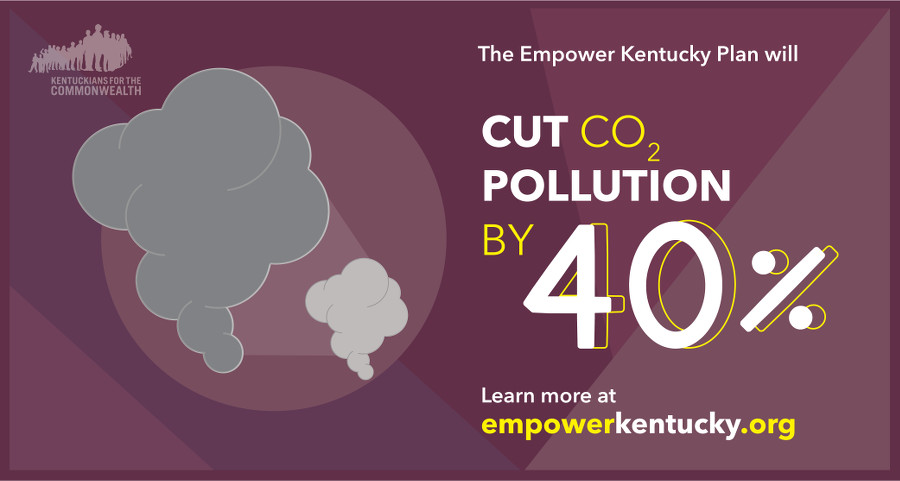“As a young person, I feel a unique sense of pressure around the changing climate. I have lost hours of sleep worrying about the physical world.”
– A Seat At The Table participant, Bowling Green“There are several climates I’m worried about. We have a social climate, an economic climate, a political climate and an actual climate that’s all shifting rapidly.”
– A Seat At The Table participant
What does this mean and why is it important?
Kentuckians have a moral obligation to protect the wellbeing of our children and future generations by reducing emissions of CO2 and other greenhouse gases harmful to our climate. Global climate change makes many life-threatening health risks and conditions more likely and more severe. The consequences of rising temperatures are evident now in Kentucky and around the world. And the risks are intensifying over time.
Meeting our responsibility to address climate change means doing everything we can in Kentucky, starting now, to reduce harmful greenhouse gas emissions. It means engaging, rather than opposing or obstructing, with the EPA’s Clean Power Plan. It means making plans and taking actions to meet – or better yet exceed – the CPP’s requirement that Kentucky reduce CO2 pollution from our power sector by 31% by 2030. It means making sure our energy transition doesn’t just replace coal plants with other risky and polluting energy sources. And it means recognizing that the electric power sector is just one of many systems (including transportation, waste, food and agriculture, and community planning) that are in need of transformation.
Meeting our responsibility also means taking seriously the threat climate change poses to our health and wellbeing. The American Public Health Association has declared 2017 the “Year of Climate Change and Health,” and for good reason. In Kentucky and beyond, we are seeing more days of extreme heat, more frequent and extreme storms, more severe flooding events and more serious droughts. Those conditions contribute to higher rates of heat stroke, heat stress, asthma, allergies, and cardio-respiratory failure, and storm-related deaths. Rising temperatures mean many insect borne diseases – including Zika virus, dengue fever, and dangerous tick diseases – are affecting more places and more people. Climate change also puts more people at risk of water and food shortages or of becoming environmental refugees.
Importantly, the steps needed to reduce the risks of climate change can also produce immediate benefits for Kentucky’s economy, health, and resiliency today. Relying more on efficiency and renewable energy sources makes the air we breathe cleaner and healthier right now. Clean energy sources, including efficiency, can create jobs, reduce costs, and encourage private investment across Kentucky right now. On the other hand, delaying action only makes our problems worse, and the eventual solutions more expensive.
Kentucky has been a leading coal state for more than a century. Today we must play a leadership role by stepping up to do our part to protect our health and climate. A just transition to a clean energy economy is possible here in the Commonwealth. The steps we take in that direction are the legacy we leave to our children and grandchildren. Our story, the story of how we shaped a just transition, can inspire the world.
Empower Kentucky Recommendations

- Develop an energy plan for Kentucky that exceeds the minimum requirements of the Clean Power Plan, whether or not the federal climate rule is ultimately upheld.
- Repeal a state law that prohibits Kentucky’s energy agency from developing a meaningful plan for reducing CO2 pollution from our power sector.
The Kentucky General Assembly passed a law in 2014, before the EPA had issued the first draft of the Clean Power Plan, making it essentially impossible for the Kentucky Energy and Environment Cabinet to develop a plan that complies with the climate rule.
- Prioritize no-regrets, low-risk energy solutions and take into consideration multiple important goals and outcomes when developing an energy plan for Kentucky.
Reducing CO2 pollution is an essential goal of any state energy plan, but it is not the only one. The Empower Kentucky Plan shows it is possible to shape an energy plan that prioritizes low-risk energy solutions and achieves better outcomes for Kentuckians across many important measures, including jobs, health, average bills and just transition.Keeping multiple goals in view during a planning process can help bring Kentuckians together to creatively address our shared challenges. It can also help our state make wise decisions, and avoid risky ones.
- Adopt policies to reduce CO2 pollution from Kentucky’s electric power sector by at least 31% by 2030 from 2012 levels.
The Empower Kentucky Plan cuts CO2 pollution from Kentucky’s power sector by 40% over the next 15 years, exceeding the Clean Power Plan’s requirement. State government should do no less and adopt policies that, at a minimum, meet the rule’s pollution reduction standard of 31% by 2030.

- Do not allow biomass or waste incineration to count as low-carbon or carbon neutral energy under a state energy plan.
Kentucky cannot meet our responsibility to protect our health and climate by burning more garbage or trees. Incinerating waste, mixing wood pellets with coal, or burning trees to generate electricity are sometimes promoted as so-called clean or low-carbon energy solutions. But not only do those strategies emit large amounts of particulate matter, dioxins, and other pollutants dangerous to our health; they also load our atmosphere with harmful CO2. Biomass and waste should not be considered carbon neutral simply because the original source of the CO2 pollution is not a fossil fuel.
The EPA punted in the Clean Power Plan on the question of whether or not waste and biomass may count as low-carbon or carbon neutral strategies in state energy plans. The agency left that determination largely up to states. Kentucky should write our own rules to ensure that all CO2 emissions from burning waste or biomass counts against the goal of reducing greenhouse gas emissions from our power sector.
- Repeal a state law that prohibits Kentucky’s energy agency from developing a meaningful plan for reducing CO2 pollution from our power sector.
- Meeting our responsibility to address climate change means transforming other essential systems, including housing, food, transportation and waste.
Throughout the Empower Kentucky process, we heard calls for broader and deeper changes that are necessary to build just and sustainable communities and cut Kentucky’s overall greenhouse gas emissions. While many of those important ideas go beyond the scope of a state energy plan, they are briefly outlined in the final section of this report.
Downloads
- Empower Kentucky Plan Executive Summary (pdf)
- Empower Kentucky Plan (pdf)
- Empowering Kentucky Synapse Analysis-Final (pdf)
- KFTC EJ Analysis Executive Summary (pdf)
- Environmental Justice Analysis for Kentucky, Technical Documentation (pdf)
Related Resources
- National Climate Assessment, a report by the US Global Change Research Program on climate change impacts on the United States, 2015.
- The Clean Power Plan, the federal rule announced by the US EPA in August 2015 to reduce CO2 pollution from America’s power sector
- Carbon emissions from burning biomass for energy, a report by the Partnership for Policy Integrity